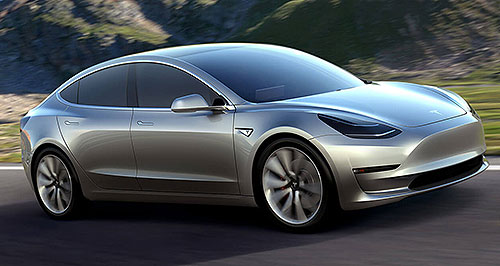Make / Model Search
News - Market Insight - Market Insight 2020Market Insight: Aussie attitudes towards EVsBig shot: Tesla’s Model 3 was the top-selling EV in Australia last year, with more than 2400 sold as buyers took delivery of the brand’s most affordable model some two years after production started in the US. Latest RACV study finds more Aussies considering an EV purchase, but barriers remainGallery Click to see larger images 4 Aug 2020 By TERRY MARTIN ELECTRIC vehicles continue to represent only a fraction of new-vehicle sales in Australia but are increasingly on the minds of motorists when it comes to their next vehicle purchase.
In the RACV’s fifth annual survey of consumer attitudes towards EVs, conducted this year in conjunction with the Electric Vehicle Council, the Victorian motoring club found that three in five motorists – 60 per cent – would consider purchasing an EV for their next car instead of a petrol or diesel vehicle, marking a 13 per cent increase over last year.
Maintenance and running costs also figure into the equation, with the RACV finding that 68 per cent of respondents saw the low ongoing cost of ownership of an EV compared to a vehicle with an internal combustion engine as a positive.
Notably, this was more important to them than the positive environmental impact of owning an EV, which came in at 59 per cent.
The survey found that oft-cited drawbacks with EVs – higher purchase prices, limited model variant choices and anxiety over driving range – still weigh heavily on the RACV’s members.
A large proportion of the survey participants – 77 per cent – said the cost of EVs compared to combustion-engined vehicles was a major deterrent when it came to their purchasing decision, while a majority (55 per cent) also said the limited number of EV models available in Australia was a reason not to buy one.
What’s more, a significant majority (74 per cent) also said they were concerned with range anxiety and the distance the car can travel. The minimum range deemed acceptable on a full charge in an EV was, on average, 461km.
Despite the high interest factor in EVs, these reality checks are clearly putting a dampener on prospective sales considering that only 31 per cent of those surveyed said they were willing to buy an EV if it was the same price as an equivalent petrol- or diesel-powered vehicle.
When asked to nominate what government policies could be implemented in relation to EVs, the vast majority cited public charging infrastructure (75 per cent), incentives to reduce the purchase price (74 per cent) and incentives to reduce the cost of installing home charging infrastructure (70 per cent).
This would likely have a positive influence as consumers consider their next purchase, but might not necessarily translate to an actual sale, with only 37 per cent of respondents saying they would be comfortable paying more for an EV provided there were greater incentives and charging infrastructure in place.
“This marks the fifth year of RACV’s survey into consumer attitudes towards electric vehicles as we look to gauge deeper as to what are some of the obstacles in the uptake of EVs in the state,” said RACV senior vehicle engineer Nicholas Platt.
“We are pleased this year that more people have indicated their intention to purchase an EV as it suggests that it is gaining in popularity and becoming a legitimate option for many.
“However, price remains a deterrent for many who are keen to make the transition to EVs, with this year no different.”
The online survey was completed by 1071 people during May when restrictions from the state’s first COVID-19 lockdown had eased, only to tighten again early in July and now move to a ‘state of disaster’ in August.
Most of the respondents were Victorians, with regional and metropolitan attitudes represented.
The results come as figures released recently by the National Transport Commission (NTC) show that 4473 EVs were sold in Australia last year, the vast majority of which – 2959, or 66 per cent – were luxury models from US brand Tesla.
This marks a 149 per cent increase over the 2357 total EV sales recorded in 2018, when Tesla similarly dominated the charts with 1005 sales compared to 1352 for all other brands combined.
Plug-in hybrid electric vehicles (PHEVs), which offer more peace of mind with their extended driving range, have also recorded solid growth in the marketplace, rising 20 per cent last year to 1402 sales.
But tempering the positive figures is the stark reality that EVs continue to only account for less than one per cent of all new-vehicle sales in Australia each year.
The total electrified vehicle market in Australia last year – including EVs and PHEVs across passenger cars, SUVs and light-commercial vehicles – made up only 0.57 per cent of the 1,027,848 new light vehicles sold across the nation.  Read more24th of July 2020  EV Council calls for mandatory CO2 standardsIndustry move to voluntary scheme a good step, but government regulation vital: EVC24th of July 2020  Car industry sets own emissions standardVoluntary scheme targets 36 per cent CO2 emissions drop for cars, light SUVs by 203030th of June 2020  Market Insight: True state of EV sales in AustraliaTesla snares 2950 sales last year from total Australian EV/PHEV market of 5875 units |
Click to shareMarket Insight articlesResearch Market Insight Motor industry news |












Facebook Twitter Instagram